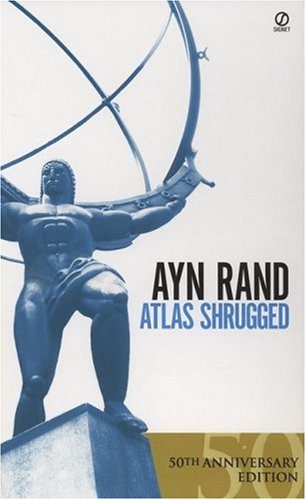
In between trips to the sensory deprivation tank and group meetings for 601 that I’ll have during the few short weeks this holiday season, I’d like to get back into regular reading.
During school semesters, I find myself mostly reading blogs, online news, the Economist, and a few random magazines like AdBusters, Vanity Fair, Wine Spectator, and Travel & Leisure. I love reading, but can’t really find time to devote to sitting down, turning off the laptop, and reading a book. But that’s one of the great things about the holidays – you finally have no excuse for procrastination.
I’m going to finish reading ‘Atlas Shrugged’, Ayn Rand’s seminal tome of objectivism and free-market capitalism. And it’s a bizarre time to be reading about laissez-faire economics given the economic crisis that somehow necessitates government nationalization of key industries, bailouts, and a general rejection of the idea that individuals acting in their own self-interest will create an optimal economic outcome.
I’m at page 593 of Atlas Shrugged. The book is 1063 pages and has a font size of 8. It’s ridiculous. But still I persevere. The story is interesting, if not a bit pithy and needlessly arcing.
But what really makes me keep flipping the page is the survivalist philosophy espoused by the protagonists. Ideas like fairness is irrelevant in an argument (because who is to say what’s really fair?) or that individuals have no obligation but to themselves. As a book it is a testament to self-interest and competition. It wholly defends rationality and discredits the concept of intrinsic value or subjective interpretation. This is known as objectivism.
For example, an apple is an apple. Reality is exactly what things are, not some perceptual cloak that society has elaborately created to shape our understanding of the world.
Things are what they are, therefore what grounds do we have to question reality? If all we know of reality is what we can see, sense, and experience, then there is no rational basis upon which we can claim that it's manufactured or false.
The plot of Atlas Shrugged is set in the context of a decaying industrialist society whose government and leaders believe that nothing is absolute and refuse to believe that labour productivity actually contributes to personal well-being. Citizens become pessimistic and willfully commit themselves to a collectivist mentality, believing that society’s best interests supercede their own.
In a utopia (or Marxist state) this philosophy might work, however with no one accepting individual responsibility, the world collapses. Trains stop running, electricity shuts off, people go hungry.
Now I’m hardly suggesting that this will happen with an Obama administration – but it’s interesting to study Atlas Shrugged as an analogy to what’s happening now. The same sense of free-market individualism that Ayn Rand supports can be thought to have catalyzed the overleverage that crashed our economy.
I think for Gen Ys, Atlas Shrugged really is the perfect literary guilty pleasure. We’re not willing to accept Rand’s hard-as-nails rationality about charity or welfare, but we’re salivating over the affirmation that individuals must have personal ownership and accountability to contribute to a healthy and functioning society.
The film adaptation is scheduled for a 2009 release, and if you needed another reason to hate Angelina Jolie (although I actually love her) she’s apparently going to be the lead.
Thursday, December 11, 2008
Admit it Gen Y, you love Atlas Shrugged
Posted by
Max Billings
Labels:
books,
gen y,
individualism,
perception,
philosophy
Subscribe to:
Post Comments (Atom)


No comments:
Post a Comment